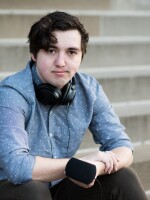For many Chico residents, the city's streets can be uncomfortably dark at night. A lack of streetlights, combined with potholes and large cracks in the sidewalk, can make walking or biking at night dangerous.
"Many of [Chico State's] south campus residents expressed their concern," said Chico City Councilmember Katie Hawley. "Once they stepped foot off campus, they no longer felt safe. And much of that was due to environmental design, such as street lighting."
In response, Hawley started an effort to look at street lighting in the city.
"We determined that we would want to give ourselves some homework," she said. "So every single councilor would go explore their districts, speak to residents and local neighborhood organizations about what part of their district is most at risk due to low lighting."
The street light initiative is now being discussed by the city's Internal Affairs Committee, which will meet early next month to present their findings and direct city staff on how to move forward.
Too much light
One area of concern when adding streetlights is light pollution. In urban areas, streetlights, car headlights, and building lights can brighten the night sky.
"If you had a hose and you're watering your plant, and 80% of the water wasn't getting to your plant, you'd throw the hose away. Same with streetlights," said Jared Geiser, executive director of AltaCal Bird Alliance. "We're sending most of our light up into the atmosphere, obstructing the night skies, where we could have the lights really directed down, and not wasted."
Geiser is an advocate for reducing light pollution. He said light pollution has negative effects on local wildlife.
"Eighty percent of all North American migratory birds actually migrate at night. And so the issue with light pollution is it might confuse them," he said. "It might cause them to land in an area where they shouldn't, and then it stuns them, and they might be more vulnerable to predation. Also it causes collisions. It confuses the birds and causes them to hit buildings."
Lights can also disrupt the sleeping cycle of nocturnal animals, or daytime birds that rely on sunset to know to return to their nest.
They also have a similar effect on humans.
"Our bodies have this circadian rhythm, this natural wake and sleep cycle," Geiser said. "So we need darkness at night to signal to our bodies that we need to sleep. And so excessive light pollution: glares in our windows, or from internal sources in our bedrooms, does negatively affect our sleep [and] people's ability to fall asleep and stay asleep."

How cities can keep skies dark
One way to cut down on light pollution is to put shielding on the street lamps. They're basically large cones that block the light from scattering upward and direct it downward toward the street. Geiser also said that buildings could turn off their lights at night, and that certain lights could be motion-activated so they don't shine all night long.
Hawley said she's aware of the concerns around light pollution, and expects it to be a topic of discussion within city government as the projects move forward. She also said brighter light doesn't always mean safer light.
"If we're thinking of a biker cycling through a street at a pretty fast speed, getting sudden bursts of super bright light can actually be more dangerous," Hawley said. "So not only is it safer for wildlife ... but it's also important for human health and human safety, when we're considering what light pollution is doing to our environment."
The city's Internal Affairs Committee will meet and present its direction on streetlight initiatives to city staff on March 3.



